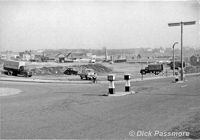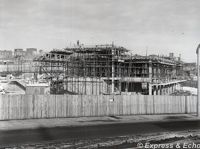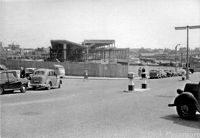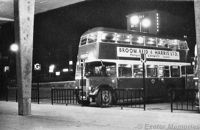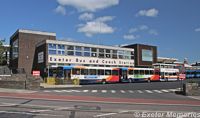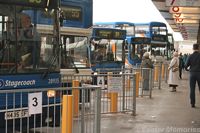
Paris Street Bus Station – 1964
Page updated 25th July 2016
Back to Transport
By the late 1950s, Exeter’s bus and coach station at Paul Street was proving to be inadequate. Not only was it too small for the increasing traffic, as tourism brought more people to Exeter, in transit to Torbay and Cornwall, but access was awkward, from both the east and west.
The construction of the inner bypass from Blackboy Road to Magdalen Road, and its eventual linking with two new Exe Bridges, routed traffic to the south of the inner city. It was therefore deemed appropriate that a new bus and coach station be constructed on a large site next to the new bypass, on a plot of land off Paris Street. The site had been badly damaged during the blitz, and the weed strewn bomb site was ripe for redevelopment.
Exeter City Council’s planning office drew up plans for a two tier complex, the upper section for local and regional services, and the lower for a coach park to service the burgeoning coach traffic in and out of the city. Between the two, was the entrance from Paris Street, which led to the ticket offices, toilets, restroom for crews and a large public cafeteria. The boundary along Paris Street was edged with raised flower beds.
Design and construction was directed by the City Architect, H B Rowe, while the perimeter, landscaping and parking areas was supervised by John Brierley, the city architect. Staverton Contractors were responsible for the building work, while Helical Bar & Engineering Ltd dug the foundations and constructed the reinforced concrete framework. The hard standing and perimeter work was carried out by Ruddock and Meighan, with the final planting done by the City Council’s Parks Department.
Opening
The lease of the new bus station was signed by Devon General on 5 July 1964, and the official opening by the Mayor of Exeter, Patrick Spoerer was on the 16 July. After the opening, the representatives of Devon General, Southern National and Greenslades Tours, along with the civic dignitaries dined at the Imperial Hotel.
The new facility was used by the Exeter Joint Services, apart from the internal city services designated with a letter route number. The eighteen departure bays were provided with individual stand indicators, while opposite there was room for two rows of parking along the wall bounding Bampfylde Street. The lower coach parking could accommodate 72 vehicles, for long distance services. The central passenger area provided seating, vending machines, timetables, telephones and information boards. A large waiting room was provided, with expansive windows, for passengers to keep an eye on the readiness of their service. An enquiry office, left luggage, staff canteen and kitchen completed the facilities in the complex. Inevitably, over the years, changes have been made to the facilities.
Local and long distance services had separate entrance and exits–two entrances in Cheeke Street, and two exits in Paris Street. The drop in coach traffic, as car ownership grew, meant the that by 1984, long distance coaches arrived and departed from the upper bus bays.
On July 5 2014 the coach park was filled with vintage vehicles for the 50th Anniversary of the signing of the lease by Devon General. Organised by the Devon General Omnibus Trust, the event was attended by hundreds, who enjoyed the free Magical Mystery trips on vintage vehicles.
Redevelopment
The fate of the 11.5 acre bus station is now in the balance, as travel habits have changed. Since the redevelopment of Princesshay, and John Lewis has opened, the bus station site has become increasingly vulnerable to the developers wanting more retail units. In addition, the City Council has been looking for a site for a new swimming pool to replace the 75 year old Pyramids, in Heavitree Road. Plans have been put forward to redevelop the bus station, with a smaller bus station and leisure swimming pool complex. Costing £200 million, the new development is scheduled to open by 2018. Land Securities (who seem to own the city) will also include a mix of shops and restaurants. The leisure centre and pool complex has been designed by Gale and Snowden–the pool will be a 25 metre, eight lane competition pool, a 20 metre four lane training pool and a small children’s pool.
Sources: Express and Echo and Devon General by Leslie Fulkard.
│ Top of Page │
